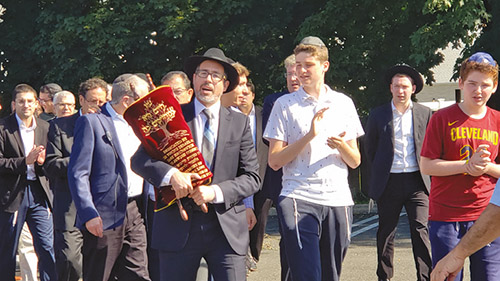





Over 200 people gathered to welcome a new sefer Torah to the Young Israel of East Brunswick (YIEB) on Sunday, October 3, with a procession leading from the home of the congregation’s rabbi to the synagogue parking lot. The celebration continued with live music and enthusiastic dancing with all the synagogue’s sifrei Torah before the formal program.
Dr. Seth Cohen, the Torah campaign co-chair, welcomed everyone and explained that the celebration was the culmination of a months-long initiative intended to bring the YIEB community together while recognizing those families that lost loved ones in the pandemic or suffered economic distress, and honoring generations past, present and future.
YIEB’s rav, Rabbi Joshua Hess, noted how honored he was to celebrate such an event, and welcomed esteemed rabbis from Ner Yisroel Yeshiva in Baltimore. Rabbi Hess stated that the Torah is not merely a book of laws, but is a song that one should carry in their hearts. He referenced a Tosafot commentary on the instance where the prophet Yehoshua was confronted by an angel with a sword and a rebuke for neglecting Torah study and ritual sacrifices while preparing for war. If the Torah was merely considered a guidebook, then it is understandable that there was no time to study while conducting wartime preparations. However, if the Torah is considered a song that is part of a person’s essence, then there is no moment that a person would be without it.
Congregational leader Jeff Pearlman thanked all those involved with making the sefer Torah event a success and introduced the keynote speaker, Rabbi Yissocher Frand.
Rabbi Frand noted that the 613th mitzvah is to write a sefer Torah and that in January 1980 his late mother-in-law, Rebbetzin Esther Blumenkrantz,dedicated a sefer Torah. At that time, it was a rare event. While it is not an everyday occurrence, it is less rare today. Yet each time a Torah is written and dedicated, there are joyous ceremonies and the event is never taken for granted.
Continuing the comparison to the Torah as a song, Rabbi Frand noted the word for song, “shira” is related to the word “yashar” (straight), and what makes each song beautiful is how the notes are placed in the proper order. “There is nothing more straight than a sefer Torah,” often called the Sefer HaYashar, for being straight and consistent with no loopholes.
Rabbi Frand added that the Torah has a special universal appeal to people around the world that other topics or subjects lack. Astrophysics, for example, has an appeal to only those in the field. Comparing the Torah to a song, music has a universal appeal and is relevant and applicable across all demographics. The uniqueness of the Torah has people across the world learning the same parsha of the week, whether they be the greatest rabbis of the world or preschool students.
Rabbi Frand shared a story of one of the most memorable Torah dedications he was aware of. An elderly Holocaust survivor dedicated a sefer Torah, and members of his congregation were amazed that this seemingly poor man would have the funds to do so. The elderly man explained that while in the concentration camp, a Nazi soldier demanded that he give up his boots. He was shocked that the boots he was given in exchange were lined with parchment from a Sefer Torah. Although not wanting to demean the Torah by walking on it, the man realized that he would not survive the harsh Polish winter without doing so. He vowed that if he survived he would commission a Torah as atonement for wearing the boots. Upon coming to America, he saved his pennies for decades until he had the necessary funds.
In conclusion, Rabbi Frand said that our nation’s name, Yisroel, begins with the smallest letter of the Hebrew alphabet (yud) and ends with the largest (lamed). A Jew starts small and grows by learning. It is not coincidental that the word for learning (lamed) has the same root letters as the lamed. May we continue to learn and grow in this generation and to the future.
Dedications are still available to support the new Torah. Funds raised in this initiative will also allow YIEB to secure funds to maintain the shul’s other Torahs and help support their annual scholar-in-residence program. More information can be found at https://www.yieb.org /form/sefertorah.html
By Deborah Melman










